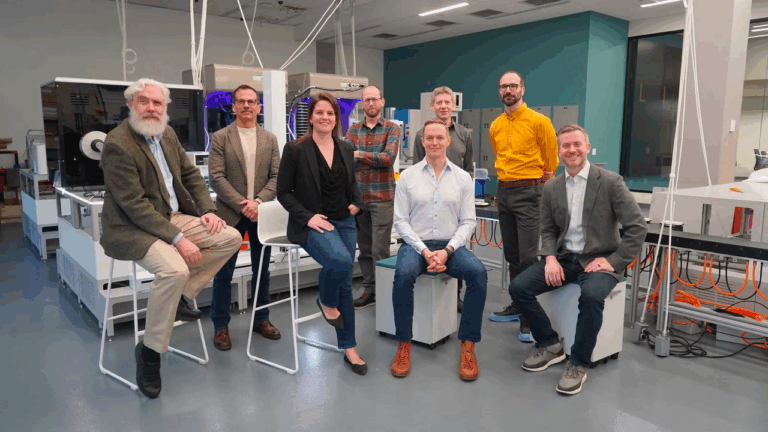Command Palette
Search for a command to run...
Former Stanford President Becomes CEO, AI Pharmaceutical Startup Receives $1 Billion Investment; British AI Pharmaceutical Company Lays off 30% Employees Again; First AI Gene Editor Announced to Be Open Source

AI for Science Company News Overview——
- British AI pharmaceutical company cuts 30% jobs again
- $20 million in financing, AI accelerates innovation in electric vehicle battery technology
- AI pharmaceutical startup receives $1 billion in funding
- The first AI+patient psychological quantification company received 15.5 million euros in financing
- First AI-generated gene editor announced as open source* Pfizer AI predicts ligand-protein interactions
- CartaBio Completes Multi-million-dollar Financing
British AI pharmaceutical company cuts 30% jobs again
Recently, BenevolentAI announced that it would cut its software product release plans, lay off 30% employees, and close its US office. Subsequently, BenevolentAI plans to use the saved funds to develop a PDE10 inhibitor BEN-8744 for the treatment of ulcerative colitis, and is currently advancing the clinical 1b/2a phase plan. It is reported that BenevolentAI was founded in London, UK in 2013. The company is committed to using AI technology to extract knowledge that can promote drug development from scattered medical research information, thereby accelerating the research and development process.
$20 million in financing, AI accelerates innovation in electric vehicle battery technology
Recently, Chemix announced the completion of a US$20 million Series A financing round, led by Ibex Investors. The funds raised will be used to expand technological innovation and meet the growing demand of the electric vehicle market. It is reported that Chemix is an American electric vehicle battery developer founded in 2021. The company is committed to promoting the innovation of electric vehicle battery technology and using AI technology to design and manufacture more efficient, safer and more economical batteries. Ibex Investors is an investment institution focusing on technological innovation and sustainable development.
AI pharmaceutical startup receives $1 billion in funding
Recently, Xaira Therapeutics, an AI biotechnology company jointly incubated by venture capital ARCH Venture Partners and Foresite Labs, a biotechnology company under Foresite Capital, received over $1 billion in financing from investors including F-Prime, NEA, and Sequoia Capital. Some media reported that this is the largest amount of financing in the biopharmaceutical field this year.
It is reported that Xaira was founded in May 2023. The company's CEO Marc Tessier-Lavigne was the president of Stanford University. The board members include former FDA Commissioner Scott Gottlieb, Stanford University chemist and Nobel Prize winner Carolyn Bertozzi, and former Johnson & Johnson CEO Alex Gorsky.
The first AI+patient psychological quantification company received 15.5 million euros in financing
Recently, Cognivia announced that it has received a strategic investment of 15.5 million euros. This round of investment was jointly funded by three investment funds from the European Union: Vesalius Biocapital IV, SFPIM and WE. This funding will help Cognivia launch its predictive clinical trial solutions and accelerate the development of innovative treatment options for patients around the world.
It is reported that Cognivia is the first and currently the only company that combines psychological quantitative treatment with AI technology. Based on a quantitative understanding of patients' psychological characteristics, expectations and beliefs, the company collects data through self-developed specific questionnaires and uses machine learning algorithms to predict patient behavior and treatment responses in clinical trials, thereby improving the evaluation of efficacy in clinical trials and other fields.
First AI-generated gene editor announced as open source
Recently, Profluence, an American AI protein design startup, launched the OpenCRISPRTM program and open-sourced the first AI-generated gene editor, which made precise edits to the human genome for the first time. The editor is licensed free of charge for ethical research and commercial use. It is reported that the gene editor is based on Profluence's large language model and consists of Cas9-like proteins and guide RNA. At present, the company has generated millions of diverse CRISPR-like proteins that do not exist in nature.
Founded in 2022 and headquartered in Berkeley, California, Profluent is an AI-driven protein design company dedicated to developing deep generative models to design and validate novel functional proteins, thereby revolutionizing biomedicine.
Pfizer AI predicts ligand-protein interactions
Recently, Pfizer and CeMM, the Research Center for Molecular Medicine of the Austrian Academy of Sciences, have developed a method using machine learning and artificial intelligence to predict the binding activity of hundreds of small molecules to thousands of human proteins. The study revealed tens of thousands of ligand-protein interactions, providing new ideas for the development of chemical tools and treatments.
It is reported that CeMM is a biomedical research institution focusing on inflammation, infection and cancer. It follows the highest scientific research standards and provides a good scientific research environment for researchers from more than 35 countries. It has multiple technical platforms such as chemical biology screening platform, mass spectrometry analysis, and next-generation sequencing. Founded in 1849, Pfizer is a science-based, innovative, patient-first biopharmaceutical company dedicated to advancing human health and promoting the prevention, treatment and cure of diseases.
CartaBio Completes Multi-million-dollar Financing
Recently, CartaBio announced the completion of an angel round of financing of tens of millions of yuan. Investors in this round include Danen Capital, Coho Deeptech, and Industrial Capital. The proceeds will be used for team building, SAFE platform application development, CellBERT large model platform upgrades and iterations, and commercial application promotion. It is reported that CartaBio is headquartered in Boston, USA. The company's founder, Dr. Robert Yang, was the global head of Johnson & Johnson's data science and biomarker department. The team members mainly come from Johnson & Johnson, Harvard Medical School, Princeton University, University of Michigan, etc.
SAFE, a new type of living cell fluorescence imaging platform with spatiotemporal resolution, is efficient, fast, non-toxic, quantitatively accurate, and low-cost. It can simultaneously perform longitudinal analysis of multiple biomarkers in living cells or tissues. CellBERT is the world's first multimodal large model with cells as the basic unit. The platform has the ability to self-learn "cell rules" and can achieve unified integrated processing of cell dictionaries, cell maps, and drug mechanisms.








